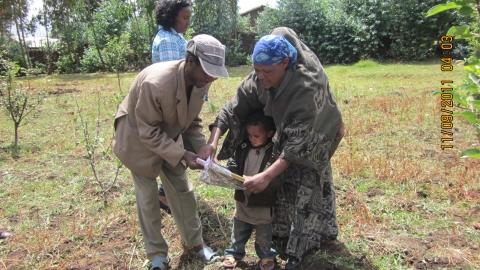
Tigist Muleta, right, and her husband Mulugeta with two of their children, one standing with them, the other on her back.
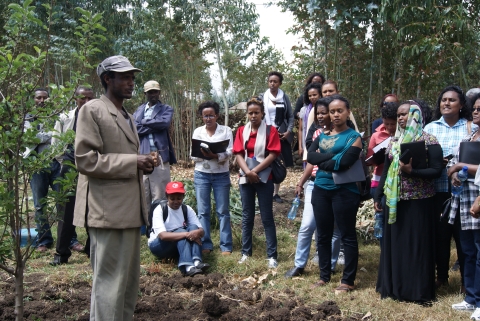
Mulugeta Gurumu telling his story to journalist trainees.
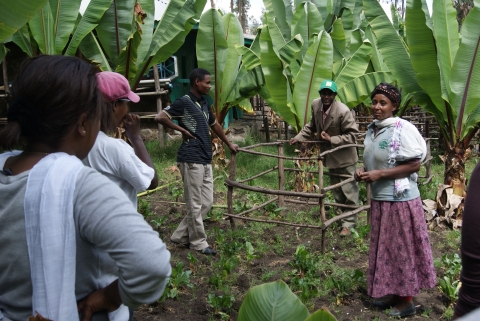
Local farmers gather to talk with the journalists.
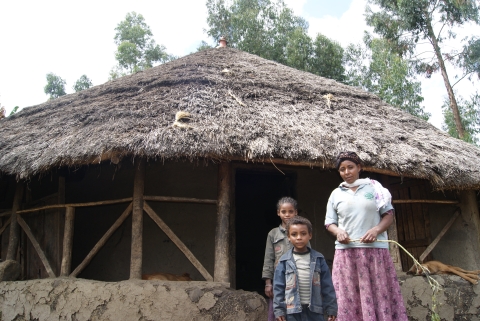
A local woman at home with her children.
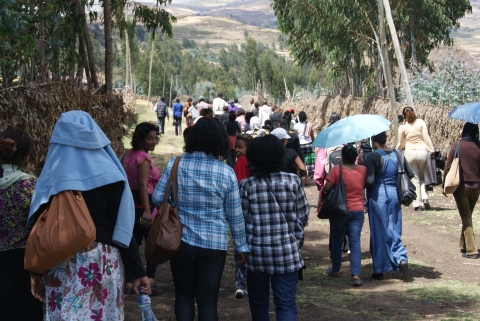
Journalists taking part in the workshop head for a discussion with local villagers.
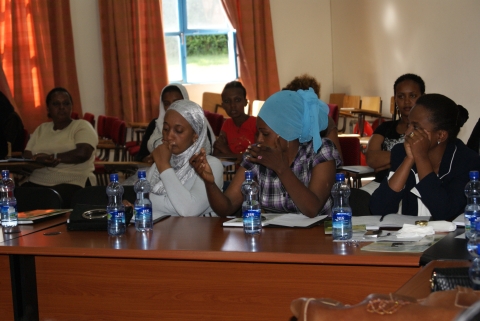
Health journalist Amina Abdulahi shares her experiences with other health journalists at the workshop.
Tigist Muleta has the kind of story I want all my journalism trainees exposed to. She could have been another statistic – a wife at 14 who finds that repeated pregnancies threaten the comfortable life she envisioned. Instead, a new awareness of health and reproductive choices helped turn her life around.
Although Tigist was quickly the mother of three, her relatives in Ethiopia’s remote district of Girar-Jarsso still advised her and her husband to have more children – considered wealth there. Then a community health worker taught the young couple about family planning methods. Her husband began to cultivate cash crops, which helped them earn a better living. Also, Tigist began using the methods to prevent more, unplanned pregnancies. Now she is poised to continue her own schooling, and she is gaining the strength that will allow her to work on the family farm – two things that might not have been possible with the arrival of more babies.
Tigist’s story highlights the kind of power that comes with knowledge, so I was excited for her to share her tale with women health reporters in my fourth health journalism workshop. After three training workshops for health journalists in the capital city of Addis Ababa, I had decided to expand my reach to the outlying areas of Ethiopia. I worked in collaboration with the PHE Ethiopia-Consortium, an organization that works to improve health and the environment across the nation. Together we attracted 50 women journalists from six regional states and different media organizations to the workshop in Debre Zeit, about 25 miles from Addis Ababa.
Amina Abdulahi is a broadcaster at the Harar Mass Media Agency. A participant in my workshop, she put her finger on the reason reporting on issues like family planning, adolescent health and HIV/AIDS can be particularly difficult in outlying areas. According to Amina, Harar is considered the “fourth holy city” of Islam, with many mosques and shrines. The inhabitants of Harar represent several different ethnic groups, both Muslim and Christian. Amina says there are lots of myths surrounding sexual reproductive health that are wrapped in old religious and traditional ideas.
Our group traveled to Tigist’s town, about 75 miles away, where we met her and several other women whose lives have been changed by PHE’s efforts to empower women farmers with reproductive education.
Amina was inspired by the story of Tigist, and plans a radio program about her and her husband. However, Amina admits that the story she is going to present for her audience will focus on the family’s ability to produce cash crops to earn more income. She knows her audience, and understands that many of them are not comfortable hearing family planning and reproductive health discussed as personal choices on the radio. I realized that Amina’s worry is shared by other trainees as well. It was gratifying to watch as they found new and creative ways to approach these sensitive topics – primarily presenting them as broader income, political, legal and cultural issues. It was a reminder that no matter how important a story might be, it has to be told in a way the audience can understand.